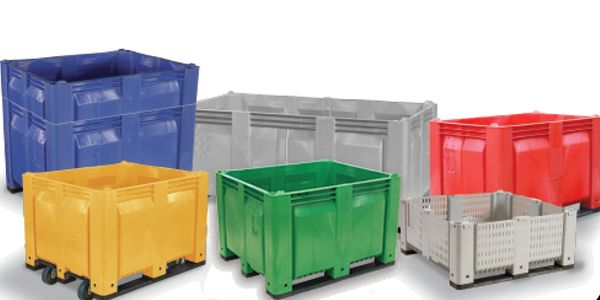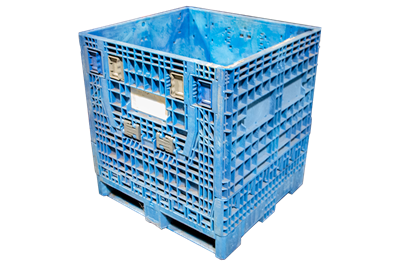Recognizing Leasing Plans for Mass Plastic Containers: What You Required to Know
Leasing mass plastic containers can be a tactical choice for businesses seeking to take care of costs and performance. Nonetheless, guiding via the complexities of leasing contracts needs cautious factor to consider. Trick elements such as lease duration, settlement frameworks, and upkeep responsibilities have to be extensively evaluated. In addition, potential hidden fees and the lessor's reputation play crucial duties in forming dependable partnerships. Comprehending these aspects is essential for making informed decisions in an ever-evolving market landscape. What elements should one prioritize to ensure a successful leasing setup?
The Advantages of Leasing Mass Plastic Containers
Leasing mass plastic containers offers a pragmatic service for services seeking performance and cost-effectiveness. This method enables companies to accessibility top notch containers without the significant in advance financial investment commonly connected with investing in. By leasing, organizations can assign monetary resources a lot more effectively, focusing on core procedures as opposed to hefty capital expenses. Additionally, leasing plans frequently include upkeep and assistance services, ensuring that containers remain in peak problem and decreasing the concern on internal sources.
Furthermore, leasing gives flexibility, making it possible for business to adjust their container supply according to fluctuating need (Bulk Plastic Containers). This flexibility can bring about enhanced inventory monitoring and reduced waste. Moreover, leasing can help with accessibility to the newest container innovations, helping companies remain affordable in a quickly changing market. Inevitably, the advantages of leasing bulk plastic containers can improve operational performance, boost money flow, and assistance lasting practices, making it an attractive alternative for different sectors

Trick Factors To Consider When Choosing a Leasing Contract
What elements should services consider when choosing a leasing contract for bulk plastic containers? Firms should examine their particular demands, consisting of the type and quantity of containers needed, to make specific the arrangement straightens with operational needs. Next off, the lease period is vital; organizations should figure out if a temporary or long-lasting lease finest suits their supply turnover and usage patterns.
Expense is another significant consideration; businesses must assess the overall expense of leasing, consisting of any kind of hidden charges or fees. Additionally, they must examine the distributor's reputation and reliability, as a reliable partner can influence the overall leasing experience.

Flexibility likewise plays a vital role; businesses might take advantage of agreements that permit adjustments in container quantities based upon transforming requirements. Evaluating upkeep and assistance choices offered by the renting firm is crucial to guarantee operational continuity and decrease disturbances.
Recognizing Leasing Conditions and terms
A comprehensive understanding of leasing terms and conditions is essential for businesses to browse the complexities of leasing bulk plastic containers properly. Leasing contracts typically consist of crucial elements such as lease period, payment frameworks, maintenance obligations, and termination stipulations. Businesses need to very carefully assess the lease period to assure it aligns with their operational demands, whether temporary or long-term. Payment structures might vary, including quarterly or monthly settlements, and recognizing these can substantially influence money circulation. Upkeep duties should be plainly specified, as they establish who is answerable for repair services and upkeep during the lease duration. Furthermore, discontinuation clauses can stipulate conditions under which the lease can be ended too soon, which is vital for organizations anticipating potential adjustments sought after. By extensively examining these terms, organizations can make informed choices that straighten with their strategic goals and functional demands.

Usual Pitfalls to Avoid in Leasing Program
While maneuvering leasing arrangements for mass plastic containers, organizations frequently run into usual pitfalls that can result in costly mistakes - Bulk Plastic Containers. One significant issue is falling short to thoroughly understand the lease terms, which can lead to unanticipated costs or responsibilities. Furthermore, forgeting the significance of appropriate container upkeep might result in pricey repairs or penalties for damages. An additional regular mistake is not examining the complete price of the lease, including surprise charges such as insurance from this source coverage or transportation
Companies might likewise neglect to examine the owner's reputation, taking the chance of collaboration with an unreliable provider. Not taking into consideration the flexibility of lease terms can impede functional adaptability. Ultimately, insufficient paperwork of the leasing arrangement can develop conflicts, causing monetary or lawful complications. By recognizing these risks, organizations can better prepare themselves to navigate leasing setups more efficiently and stay clear of destructive consequences.
Tips for Bargaining the Best Lease Terms
How can organizations secure the most desirable lease terms for mass plastic containers? They need to perform extensive market research to understand dominating terms and rates. This knowledge empowers them to work out confidently and identify competitive deals. Next, companies can leverage their investing in volume to negotiate much better costs, stressing lasting navigate to this site setups that might benefit both parties.
Additionally, they should carefully review lease arrangements, paying very close attention to stipulations relating to maintenance, insurance coverage, and charges for early discontinuation. Involving legal guidance for a detailed testimonial can stop expensive misunderstandings.
Services ought to remain open and flexible to going over alternative terms, such as extensive lease periods for minimized monthly prices. By coming close to arrangements with preparation and a readiness to jeopardize, businesses can secure lease terms that align with their operational demands while reducing prices.
Often Asked Questions
Just how Do I Determine the Right Amount of Containers to Lease?
To determine the appropriate quantity of containers to lease, one should assess existing stock requirements, forecast demand changes, take into consideration preparations, and represent storage restrictions, ensuring an optimal equilibrium between supply and operational efficiency. plastic bulk containers.
Can I Personalize the Containers to Satisfy My Certain Needs?
Yes, modification of containers to meet specific requirements is typically feasible. Lots of leasing firms provide choices for modifications, permitting customers to customize features, sizes, and shades, making sure the containers straighten with functional demands and choices.
What Occurs if I Need to Return the Containers Early?
If containers are returned early, the leasing arrangement may state fees or penalties. The business could examine the condition and use, possibly readjusting expenses based upon the staying lease term and pre-established terms.
Are There Any Type Of Maintenance Duties for Leased Containers?
Rented containers normally need the lessee to maintain them in great problem, resolving minor damage. Significant repair services generally drop under the lessor's duties, yet specifics can vary based upon the leasing arrangement.
Exactly how Is the Leasing Rate Structured Over the Contract Period?
Leasing prices are generally structured based upon the period of the agreement, frequency of settlements, and container specs. Extra factors, such as maintenance and insurance policy expenses, might likewise influence the overall rates plan over time.
